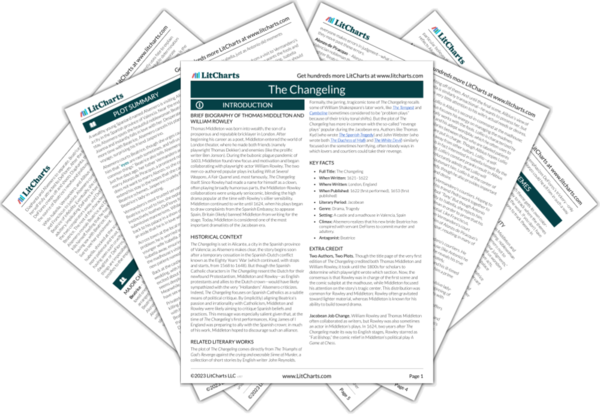Appearance vs. Reality
At the very beginning of Thomas Middleton and William Rowley’s play The Changeling, noblewoman Beatrice warns her new crush Alsemero not to trust appearances: “our eyes are sentinels unto our judgments,” she explains, “but they are rash sometimes, and tell us wonders of common things.” Indeed, throughout the play’s five acts, characters’ eyes mislead them again and again. Two palace courtiers successfully disguise themselves as madmen; Beatrice’s lady-in-waiting Diaphanta pretends to be Beatrice with…
read analysis of Appearance vs. RealityPassion, Sanity, and Identity
In the climax of The Changeling, the hero Alsemero remarks that nearly everyone around him has been transformed by their desires: “here’s beauty changed to ugly whoredom,” he laments, “here servant obedience to a master sin.” These most extreme examples refer to the beautiful Beatrice and her servant DeFlores, who, motivated by various sexual longings, have conspired together to commit murder. But even in the play’s more comedic subplot, courtiers Antonio and Franciscus…
read analysis of Passion, Sanity, and IdentityTransaction and Commodification
Though the characters in The Changeling come from many different socioeconomic backgrounds, nearly all are fixated on money and its symbolism. For the middle-class Alibius, currency is the best measure of happiness and success. He seeks to squeeze every inch of profit from his madhouse, charging high rates and forcing his patients to perform at weddings and festivals; when his wife Isabella accuses him of turning his patients into a “staple commodity,” Alibius can…
read analysis of Transaction and Commodification
Destiny vs. Agency
Throughout The Changeling, many characters attribute their feelings and circumstances to destiny. The servant DeFlores, born wealthy, asserts that “hard fate has thrust me out to servitude.” When the noblewoman Beatrice falls in love with handsome Alsemero, she declares in an aside that “this was the man that was meant me.” Later, when she is discovered as a murderer, Beatrice again asserts that it is destiny—and not her own choices—at work (“upon…
read analysis of Destiny vs. Agency






